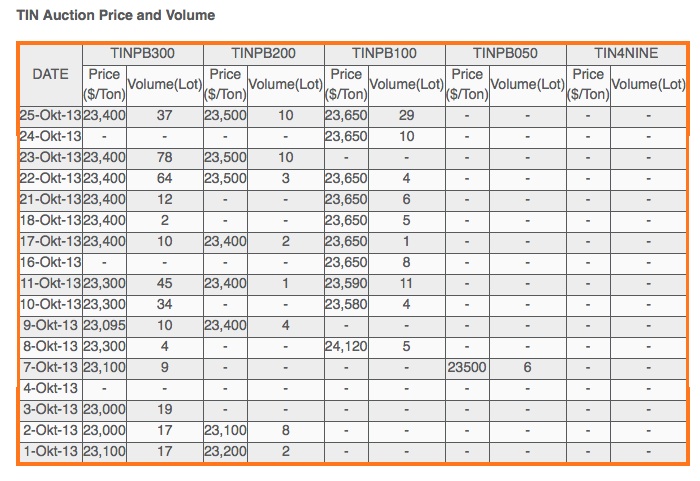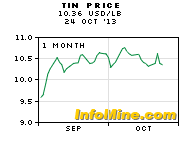For those who attended our recent Commodity/PROcurement EDGE conference, Stuart and I discussed 10 events that could shake up metals markets in 2014. Our colleague Taras previously revealed three of these events on this site. The three he mentioned – an iron ore price dip; continued downward price movement of the MW aluminum premium; and a falling GOES price – all remain on our radar. But, one of these ten warrants a more watchful eye. It involves a recent development impacting tin prices.
Earlier this year, the Indonesian authorities mandated that all tin in Indonesia must first come to market (and be sold) on a local exchange before it can leave the country for export.
We discussed at the conference that the tin producers have struggled to sell tin on to the exchange, creating a rising tin price within the Indonesian market. The data appears to bear this out if one examines the tin auction price from the ICDX (Indonesian Commodity and Derivatives Exchange) for this past month:
So what to make of this short-term price anomaly?
Now we come to the tin price on the LME (see above). We see the LME price has dipped below the ICDX price. This may appear as a short-term blip because the Indonesian export rules went into effect on August 30. Not surprisingly, exports dropped considerably for the month of September to 786 metric tons, down from August’s export level of 6525 tons. But ITRI reports that October’s export volume so far has climbed to 1,130 metric tons.
Moreover, ITRI says that now seven private Indonesian tin smelters have joined the ICDX exchange, and together they contribute to approximately half of all Indonesian tin production. ITRI goes on to opine that Indonesia would need to export about 300-400 metric tons per day to alleviate global tin supply shortfalls.
This past week has shown volumes achieving those levels on three out of five days. Therefore, we suspect that with any one single new private producer or just a slight increase of traded volume, the exchange will hit minimum liquidity volume to meet global demand.
Should tin buyers be concerned?
Why the export policy change in the first place? Like other countries actively engaged in controlling natural resources and mining sectors more closely, Indonesia seeks to displace the London Metal Exchange as the primary tin price-setting vehicle.
From a market supply perspective, we suspect volumes will continue to ramp up in the coming weeks alleviating global supply concerns. However, what will remain of interest to tin buyers throughout the world involves the Indonesian tin price and its relationship to the LME.
by Lisa Reisman
- English (UK)
- English (India)
- English (Canada)
- English (Australia)
- English (South Africa)
- English (Philippines)
- English (Nigeria)
- Deutsch
- Español (España)
- Español (México)
- Français
- Italiano
- Nederlands
- Português (Portugal)
- Polski
- Português (Brasil)
- Русский
- Türkçe
- العربية
- Ελληνικά
- Svenska
- Suomi
- עברית
- 日本語
- 한국어
- 简体中文
- 繁體中文
- Bahasa Indonesia
- Bahasa Melayu
- ไทย
- Tiếng Việt
- हिंदी
Metal Price Game Changers: Indonesian Tin Price Exchange
Published 10/28/2013, 07:54 AM
Updated 07/09/2023, 06:31 AM
Metal Price Game Changers: Indonesian Tin Price Exchange
Latest comments
Loading next article…
Install Our App
Risk Disclosure: Trading in financial instruments and/or cryptocurrencies involves high risks including the risk of losing some, or all, of your investment amount, and may not be suitable for all investors. Prices of cryptocurrencies are extremely volatile and may be affected by external factors such as financial, regulatory or political events. Trading on margin increases the financial risks.
Before deciding to trade in financial instrument or cryptocurrencies you should be fully informed of the risks and costs associated with trading the financial markets, carefully consider your investment objectives, level of experience, and risk appetite, and seek professional advice where needed.
Fusion Media would like to remind you that the data contained in this website is not necessarily real-time nor accurate. The data and prices on the website are not necessarily provided by any market or exchange, but may be provided by market makers, and so prices may not be accurate and may differ from the actual price at any given market, meaning prices are indicative and not appropriate for trading purposes. Fusion Media and any provider of the data contained in this website will not accept liability for any loss or damage as a result of your trading, or your reliance on the information contained within this website.
It is prohibited to use, store, reproduce, display, modify, transmit or distribute the data contained in this website without the explicit prior written permission of Fusion Media and/or the data provider. All intellectual property rights are reserved by the providers and/or the exchange providing the data contained in this website.
Fusion Media may be compensated by the advertisers that appear on the website, based on your interaction with the advertisements or advertisers.
Before deciding to trade in financial instrument or cryptocurrencies you should be fully informed of the risks and costs associated with trading the financial markets, carefully consider your investment objectives, level of experience, and risk appetite, and seek professional advice where needed.
Fusion Media would like to remind you that the data contained in this website is not necessarily real-time nor accurate. The data and prices on the website are not necessarily provided by any market or exchange, but may be provided by market makers, and so prices may not be accurate and may differ from the actual price at any given market, meaning prices are indicative and not appropriate for trading purposes. Fusion Media and any provider of the data contained in this website will not accept liability for any loss or damage as a result of your trading, or your reliance on the information contained within this website.
It is prohibited to use, store, reproduce, display, modify, transmit or distribute the data contained in this website without the explicit prior written permission of Fusion Media and/or the data provider. All intellectual property rights are reserved by the providers and/or the exchange providing the data contained in this website.
Fusion Media may be compensated by the advertisers that appear on the website, based on your interaction with the advertisements or advertisers.
© 2007-2025 - Fusion Media Limited. All Rights Reserved.

